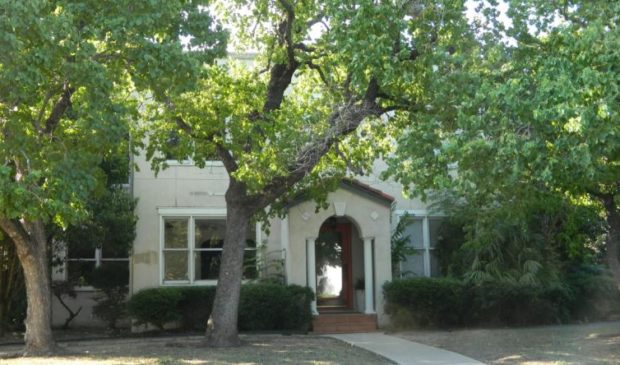Council sacrifices Old West Austin building for park improvements
Tuesday, November 15, 2016 by
Jack Craver A fourplex in Old West Austin is likely to be demolished despite a push by Mayor Pro Tem Kathie Tovo to save it in the name of historic preservation.
A resolution put forward by Tovo to initiate historic zoning on the property at 1618 Palma Plaza failed, 3-8, with only City Council members Ora Houston and Leslie Pool joining Tovo to protect the building from being razed and replaced with a different development.
Tovo originally had the backing of the Old West Austin Neighborhood Association in her attempt to preserve the building. However, after Council postponed action on the resolution the previous week, the neighborhood group struck a deal with the company planning to develop the property, by which it would drop its opposition to the demolition in exchange for a financial contribution from the developer to help finance two area parks projects.
Tom Terkel, principal of FourT Realty, the company that is planning to purchase and develop the property, told the Austin Monitor that his company has offered to provide up to a certain amount of money if the neighborhood association can come up with matching funds through its own fundraising. The money will be used to make improvements to the existing West Austin Neighborhood Park as well as to turn a small plot of land at the corner of Palma Plaza and West Lynn Street into a park. Terkel declined to say how much money his company has offered.
It is not clear yet what will replace the structure after its demolition. Terkel said he has not yet decided what to build.
Although she said she was happy to see the neighbors and the developer reach an agreement, Tovo said she would push ahead with her effort to preserve the property because of its historical and architectural significance. She warned of “losing the historic fabric of our city” if something isn’t done to slow down the demolition of old properties.
Pool and Houston similarly expressed concerns about the erosion of Austin’s historic character in explaining their continued support for Tovo’s resolution.
Other Council members saw the deal between the neighborhood group and the developer as a worthy compromise. Council Member Ann Kitchen called the deal reached between OWANA and Terkel to be a “win-win” that she could support. Council Member Sheri Gallo called the agreement “an example of all of us working together … with a really balanced solution for the benefit of the community as a whole.”
Council Member Don Zimmerman reiterated the frustration he voiced at a previous meeting about preventing property owners from demolishing their homes for the sake of historic preservation, saying that the terms invoked by preservationists, such as “historic fabric” and “community value,” were “completely subjective notions.”
“There are as many definitions and opinions of historic fabric and community value as there are people in this city,” he added.
In an interview with the Austin Monitor, Tovo said that she still plans on bringing forward a resolution aimed at reforming the process by which the Historic Landmark Commission votes on initiating and recommending historic zoning, although she is contemplating several different ways of doing that.
One possible change would be to lower the voting threshold the Historic Landmark Commission must meet to initiate or recommend historic zoning for a property from a two-thirds majority to a simple majority. She is also considering requiring a two-thirds majority vote from the commission to release a demolition permit for a property.
A number of preservationists have complained that the commission has been unable to do its work recently because of frequent absences that prevent the panel from achieving the necessary supermajority to move ahead on historic zoning cases.
“It’s been dysfunctional,” Maureen Metteauer, OWANA zoning chair, told Council. “We’ve had numerous cases in our neighborhood of properties that have been lost because of inconsistent information, lack of quorum and, really, lack of training on the part of several members of (the commission).”
The Austin Monitor’s work is made possible by donations from the community. Though our reporting covers donors from time to time, we are careful to keep business and editorial efforts separate while maintaining transparency. A complete list of donors is available here, and our code of ethics is explained here.
You're a community leader
And we’re honored you look to us for serious, in-depth news. You know a strong community needs local and dedicated watchdog reporting. We’re here for you and that won’t change. Now will you take the powerful next step and support our nonprofit news organization?










